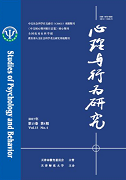|
|
The Features of Age Identity and Its Relationship with Mental Health Among Older Adults
Wu Panpan, Shao Jingjin, He Nian, Zhang Li
2017, 15(4):
520-527.
To investigate the characteristics of age identity among Chinese older adults and its relationship with mental health, four questionnaires (Age Identity Questionnaire, the Center for Epidemiological Studies Depression Scale, Self-Rating Anxiety Scale and Satisfaction with Life Scale) were administered to 646 older adults. The findings suggested that: 1)55.7% of the participants reported feeling younger than their actual age and the discrepancy was about 4.07 years. Actual age and self-rated health had a significant impact on older adults' age identity. 2)Regression analyses revealed that, older adults' mental health was significantly affected by age identity, after controlling for gender, education, and self-rated health. To be exact, older adults' anxiety and depression were weakened by age identity, but their life satisfaction level was strengthened by age identity. To sum up, Chinese elder adults showed younger bias. The younger older adults' age identity was, the less anxiety and depression they had, but the higher life satisfaction level. All our findings suggested that appropriate measures can be taken to enable older people to remain a younger age identity, which may be helpful to improve the mental health status of the elderly.
|

